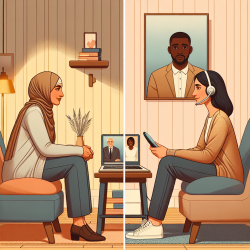Introduction
In a world that increasingly values inclusivity and accessibility, the field of speech-language pathology is evolving to meet the needs of every child, regardless of their location. The advent of speech therapy telepractice has revolutionized how we approach special education, providing personalized, effective, and engaging therapy services online. At TinyEYE, we are dedicated to empowering children through innovative virtual therapy solutions, ensuring that each child can reach their full potential.
The Power of Virtual Therapy
Virtual therapy, particularly in the realm of speech-language pathology, offers a plethora of benefits that are both data-driven and child-centered. Research indicates that online therapy can be as effective as in-person sessions, with the added advantage of increased accessibility and flexibility. Here’s how virtual therapy is transforming the landscape of special education:
- Accessibility: Online therapy eliminates geographical barriers, allowing children in remote or underserved areas to receive the same high-quality services as those in urban centers.
- Flexibility: Families can schedule sessions at convenient times, reducing the stress of travel and time constraints.
- Engagement: Interactive digital tools and resources can make sessions more engaging for children, fostering a positive learning environment.
- Consistency: Regular sessions can be maintained even during unforeseen circumstances, such as school closures or family emergencies.
Data-Driven Decisions for Better Outcomes
At TinyEYE, we believe in the power of data to drive decisions and improve outcomes for children. Our virtual therapy platform incorporates real-time data tracking and analytics, allowing therapists to tailor sessions to each child’s unique needs and progress. This approach ensures that therapy is not only effective but also efficient, maximizing the potential for positive outcomes.
Advocating for Special Education
Special education advocacy groups play a crucial role in promoting awareness and access to necessary services. By embracing speech therapy telepractice, advocates can help bridge the gap between need and availability, ensuring that all children have the opportunity to succeed. We encourage advocacy groups to consider the following when supporting virtual therapy initiatives:
- Promote Awareness: Educate families and schools about the benefits and availability of online therapy services.
- Support Policy Change: Advocate for policies that support funding and access to virtual therapy for all children.
- Foster Collaboration: Work with schools, therapists, and technology providers to ensure seamless integration of online services.
Conclusion
As we continue to innovate and expand our services at TinyEYE, our mission remains clear: to empower every child to achieve their best through accessible, effective, and engaging speech therapy telepractice. By working together with advocacy groups, schools, and families, we can create a future where every child has the opportunity to thrive.










